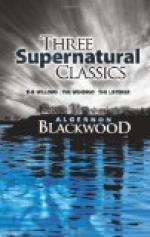Although the snow was not continuous, lying merely in shallow flurries over the more open spaces, he found no difficulty in following the tracks for the first few miles. They went straight as a ruled line wherever the trees permitted. The stride soon began to increase in length, till it finally assumed proportions that seemed absolutely impossible for any ordinary animal to have made. Like huge flying leaps they became. One of these he measured, and though he knew that “stretch” of eighteen feet must be somehow wrong, he was at a complete loss to understand why he found no signs on the snow between the extreme points. But what perplexed him even more, making him feel his vision had gone utterly awry, was that Defago’s stride increased in the same manner, and finally covered the same incredible distances. It looked as if the great beast had lifted him with it and carried him across these astonishing intervals. Simpson, who was much longer in the limb, found that he could not compass even half the stretch by taking a running jump.
And the sight of these huge tracks, running side by side, silent evidence of a dreadful journey in which terror or madness had urged to impossible results, was profoundly moving. It shocked him in the secret depths of his soul. It was the most horrible thing his eyes had ever looked upon. He began to follow them mechanically, absentmindedly almost, ever peering over his shoulder to see if he, too, were being followed by something with a gigantic tread.... And soon it came about that he no longer quite realized what it was they signified—these impressions left upon the snow by something nameless and untamed, always accompanied by the footmarks of the little French Canadian, his guide, his comrade, the man who had shared his tent a few hours before, chatting, laughing, even singing by his side....
V
For a man of his years and inexperience, only a canny Scot, perhaps, grounded in common sense and established in logic, could have preserved even that measure of balance that this youth somehow or other did manage to preserve through the whole adventure. Otherwise, two things he presently noticed, while forging pluckily ahead, must have sent him headlong back to the comparative safety of his tent, instead of only making his hands close more tightly upon the rifle stock, while his heart, trained for the Wee Kirk, sent a wordless prayer winging its way to heaven. Both tracks, he saw, had undergone a change, and this change, so far as it concerned the footsteps of the man, was in some undecipherable manner—appalling.
It was in the bigger tracks he first noticed this, and for a long time he could not quite believe his eyes. Was it the blown leaves that produced odd effects of light and shade, or that the dry snow, drifting like finely ground rice about the edges, cast shadows and high lights? Or was it actually the fact that the great marks had become faintly colored? For round about the deep, plunging holes of the animal there now appeared a mysterious, reddish tinge that was more like an effect of light than of anything that dyed the substance of the snow itself. Every mark had it, and had it increasingly—this indistinct fiery tinge that painted a new touch of ghastliness into the picture.




